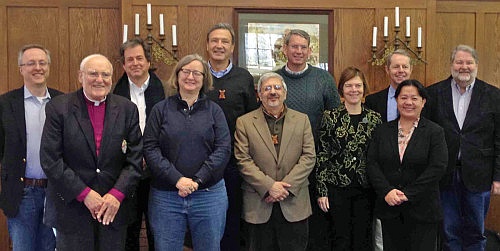
In January Dean Andrew McGowan attended the annual meeting of the Council of Deans on the campus of the Bexley Seabury Federation in Columbus, Ohio. The Council, an association of deans of Episcopal seminaries, discussed the many opportunities and challenges facing theological education in the United States.
Dean McGowan will be offering further comment in the next edition of the Journal of Anglican Studies in a piece entitled “Soundings Amid the Avalanche.” Some of his thoughts are excerpted here:
“Recent crises in Episcopal seminary education have caught much attention, but the real question for theological education may be more deep-seated than conflicts between Deans, faculty members and trustees.
“In remarks given to the Executive Council of The Episcopal Church last fall, Presiding Bishop Katherine Jefferts Schori commented favorably on the rise of local non-accredited training programs, and went so far as to say that:
The average Episcopal congregation, with 60 to 70 members attending weekly worship, cannot afford the traditional model of full-stipend paid leadership, a building, and a sufficient program to support its members in their daily baptismal ministry. Nor can seminary graduates with educational debt afford to work in most of them.
“This stark analysis is probably right, but the wrong conclusions could easily be drawn from it. Most importantly, the changes afoot do not mean a simple jump from one universal model of seminary education to another. The challenges for theological education would benefit from being considered in the light of wider education changes too.
“A 2013 report from British education policy expert Sir Michael Barber entitled An Avalanche is Coming suggested some of the key issues and prospects for higher education as a whole, while envisaging potential drastic change, including closures of some traditional institutions:
- How can universities and new providers ensure education for employability?
- How can the link between cost and quality be broken?
- How does the entire learning ecosystem need to change to support alternative providers and the future of work?
“These questions sound familiar, or should, but not even the most alarmist commentator imagines that all universities as we currently know them will close, or that distance learning schemes with internships will suddenly replace liberal arts colleges. It will be the same for seminaries. Not all can survive, at least not as we know them now, but some will. While many parishes will seek leadership from part-time and non-stipendiary clergy trained in new ways, many others–not least larger parishes, which will exercise leadership in diocesan communities and other networks–will still require pastors and teachers whose formation will best be undertaken in something resembling traditional educational settings.
“The learning ecosystem is indeed changing. A seminary program like that offered by Berkeley at Yale will be even more exceptional in future, but far from being less relevant, its work will be even more vital to a changed and changing Church.”
At the conclusion of the conference the deans issued a joint communique available here.
